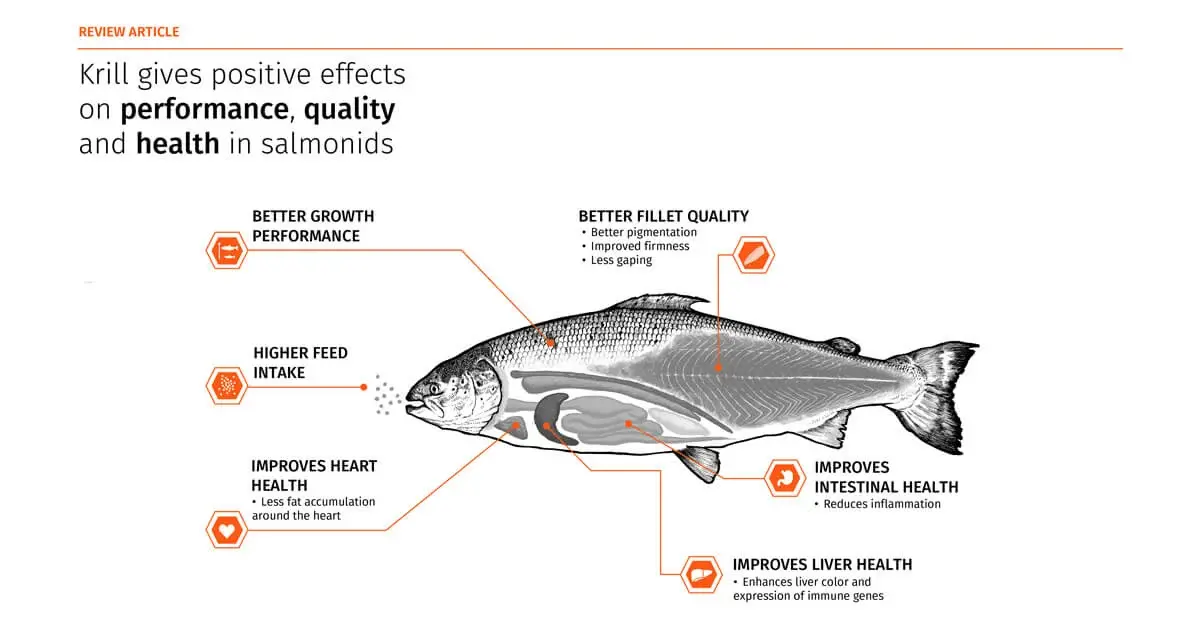In a recently released review article from Aker BioMarine, researchers conclude that Antarctic krill products have a positive impact on the feed intake, growth performance, fillet quality and organ health in salmonids, based on more than a decade of well-documented scientific studies and experimentation.
The future of aquaculture depends on sustainable and functional feed ingredients
The long-term sustainability of the aquaculture industry demands a viable range of alternative ingredients, to reduce the burden on fishmeal and fish oil for feeds. Antarctic krill products have emerged as strong contenders due to their sustainable sourcing and significant health benefits. In Aker BioMarine’s review article, the authors aggregate key findings from multiple studies on salmonids, to present a holistic overview of the specific benefits of krill meal on the fish growth, fillet quality, and organ health.
“This review paper is unique as it’s a culmination of multiple studies all showing that krill meal has proven to be a sustainable source of protein, phospholipids, omega-3 fatty acids such as EPA and DHA, feed attractants and astaxanthin, making it a key marine ingredient for fish diets. Sustainability of ingredient sources is an increasingly important factor for the aquaculture industry, which is why use of Antarctic krill is helping salmonid farmers to reduce their reliance on costly and limited-in-supply fish products,” says Kiranpreet Kaur, PhD, Director R&D, Salmonids, Aker BioMarine.
Review article reveals these key krill benefits for salmonids
- Krill meal inclusion in salmonid feed is suggested to be beneficial for enhancing feed intake and growth performance for fish, due to its feed attractant properties, with just 8-10% krill meal for 10-12 weeks considered sufficient to achieve growth performance benefits.
- The astaxanthin present in krill meal transfers to salmonid filets, improving pigmentation and overall fillet quality, based on inclusion levels of 10-15%. Besides, krill meal inclusion (10-15%) enhances the fillet quality by increasing firmness and by reducing gaping.
- Inclusion of 10-15% krill meal in the salmonid diet is beneficial for liver and intestinal health, due to the phospholipids, and phospholipid bound EPA and DHA in krill that help to reduce fat accumulation and inflammation in the liver and intestinal tissues.

Krill products are sustainably sourced, with an abundant and well-regulated biomass
Antarctic krill (Euphausia superba) is one of the most abundant species on Earth, with an estimated biomass of 500 million tons. Krill is an important part of the marine food chain in the Antarctic Ocean, and it is strictly regulated by the Commission for the Conservation of Antarctic Resources (CCAMLR). Its plentiful supply and well-documented nutritional benefits have made krill an attractive ingredient for the aquaculture industry.
More information on Aker BioMarine’s review article
The recent review article from Aker BioMarine, titled “Effects of Antarctic krill products on feed intake, growth performance, fillet quality and health in Salmonids” provides in-depth documentation of the benefits, as observed through scientific study, of krill meal in salmonid diets can be found here: https://www.hindawi.com/journals/anu/2022/3170854/.
Salmonids review paper

